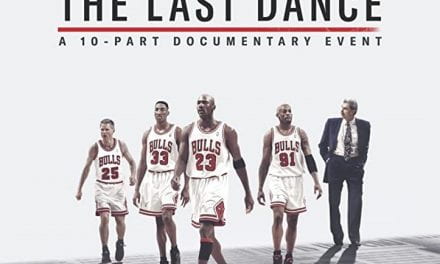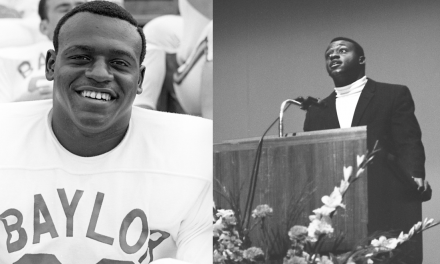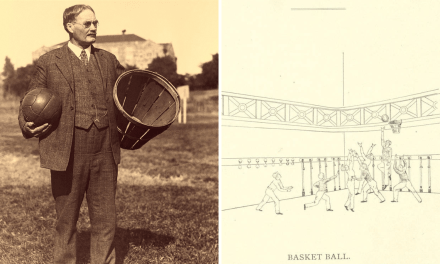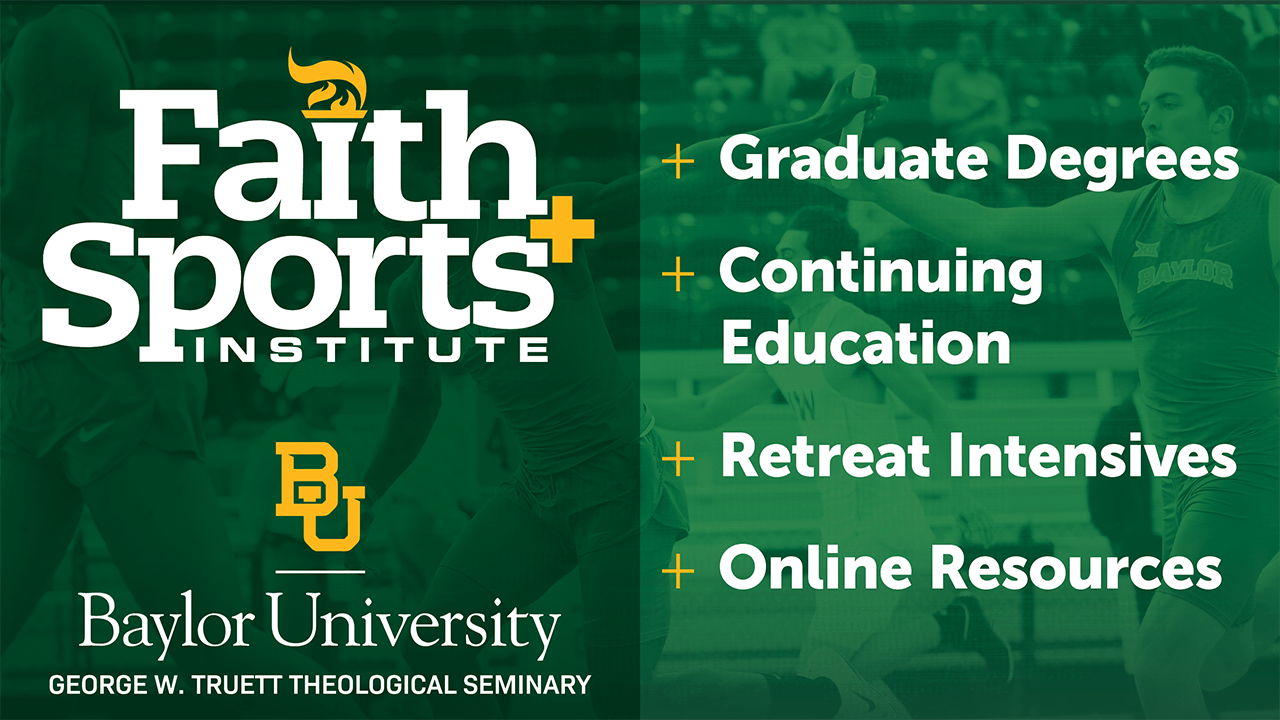
Editor’s note: This is the first of a series of interviews by Austin Hallman, a graduate student with Truett Seminary’s Faith & Sports Institute, meant to find out the answer to this question: What is God up to in sports? Austin will be interviewing leaders from different sports contexts, and we hope you will be blessed and encouraged by their testimonies. Our first interview features Zakk Revelle, an athletic director and basketball coach who is also a student in Truett Seminary’s online MA in Theology and Sports Studies program.
To start, can you tell us a little bit about what you do?
My name is Zakk Revelle, and I serve at Faith Academy in Marble Falls, Texas as the athletic director and head boys basketball coach (and currently head golf coach, though I will pass on that baton next spring gladly).
What do you love about sports?
I think what I love most is family and the camaraderie that it brings. I also like that there’s no plot, like in a movie. If you’re going to watch the Lord of the Rings, if you’ve watched it before, you know what’s coming. And within sports, there’s always this underdog story that can happen at any time. I guess my favorite thing about sports is the unknown, because you never know what’s going to happen next.
What is your favorite sports memory?
I’d say I have different favorite sports memories. As a kid, my favorite memories were just getting to play outside, with friends at recess, stuff like that. My favorite from high school would come from my senior year when we won a game at home, and it clinched the playoffs. It was the first time we’d been in a while. I was proud to be playing for the coach and the school I was at, and I wanted the future to be good.
In college, I have a weird favorite memory. I played basketball at Sul Ross State in Alpine, Texas. My senior year, the school had some trouble with the NCAA, and all sports were suspended for one year. We couldn’t go to the conference tournament or the NCAA Tournament. I remember they gathered all the athletes in this room and told us. I remember just an overwhelming sense of joy because I was so excited that God gave me 25 games that year. And I just remember thinking: “You’ve got 25 opportunities to share the gospel by the way you play. Because you don’t get any more after that.” That was probably my most memorable moment from college, though it wasn’t necessarily a moment in a game.
Tell me a little bit about your journey with the Lord through sports and how you got to where you are now.
I didn’t follow Jesus in high school. I went to FCA [Fellowship of Christian Athletes], and I remember that my basketball coach in high school was the leader of FCA. I was there because there were girls to flirt with. And there were also friends of mine that I knew and so I was like, “Well, this is cool. All my buddies hanging out at the school, and we’re talking about some Jesus guy.”
I signed to play at Ranger Junior College on a full ride coming out of high school and went there, strained a hamstring, was out for a little bit, and ended up being told I was going to be redshirted. So I decided to transfer. I was done with basketball. I was kind of mad that I had been redshirted. I wasn’t angry at God, per se. But I was just angry in general.
Then a very good friend of mine passed away of a drug overdose in 2011. When that happened, it really shook me. And that propels me to realize I’ve got to get my act together. Then I get robbed at gunpoint, and that leads me to be like, “Wow, I’ve really got to get my act together.” I start showing up at church and I feel like I’m doing a good thing. But I don’t know what that good thing is. I’m learning and listening, and then I start to work out the process, and end up starting to follow Jesus on January 12, 2012. I get baptized February 12, 2012.
After that I ended up at Sul Ross in the fall of 2012, where I played for three years.
A big change for me came in 2014. The summer before I am going to graduate from college, I heard about this sports ministry called Athletes in Action (AIA). I ended up going to Israel with AIA for 19 days and I met a guy named John Farwell who still works for AIA and is a former college basketball coach. And that was when my faith and sport really combined. I got to play in a basketball tournament in Bethlehem and being in Israel and seeing and learning things from a Jewish perspective opened my eyes.
A few months later, I am with Larry Berkman [Faith Academy’s basketball coach] during Christmas break. I’m home for two days, and I have lunch with him. He asks, “What are you going to do when you graduate?” And I’m like, “I’m just gonna walk around and talk about Jesus.” And he told me something that I’ll never forget: “Don’t underestimate the ministry that is coaching.” And I really felt like that was the Lord speaking through him because he wasn’t trying to force me into coaching.
I got out of college and ended up at Faith Academy, and I’ve never left. And since then, faith has been a constant of my life in sport.
How has your time as a Truett Seminary FSI student shaped how you think about and engage with sports?
It’s kind of funny how I’m going to answer this.
It has not made me softer as a coach, but it has made me far more empathetic. Before Truett, I wouldn’t consider myself mean, but FSI has brought to life how faith and sports are intertwined in every aspect of coaching, teaching, and life in general. It took away the compartmentalization. Ministry isn’t an every once in a while thing. This is an all the time thing. I’m smart enough to know I’m not the smartest person in the room and I want to learn from others and ask a lot of questions. Being at FSI has broadened my thought process by looking at past figures in sports and empathizing with them and being able to learn from them.
What are some skills or capabilities that you think a good sports minister or coach needs in your context?
I would say willingness. Not ability, as everybody can do it. But not everybody is willing. The willingness to adjust. And the willingness to admit that you’re wrong. That would be all of us. All of us have opinions. And typically, we all believe them to be correct. We could get into a place where we don’t ever want to admit that we’re wrong. But I think that’s one of the most powerful things we can do. Especially as a coach, admitting to your players, “I was wrong about that. I apologize.” I think that helps to gain more trust.
People talk a lot about being a player’s coach. And I would consider myself that, but for different reasons. Part of it is that the relationship aspect is a huge deal for me. But then the other part of it is just the willingness to admit you’re wrong and the willingness to adjust. Something our track coach says all the time is to be flexible. When I say a willingness to adjust, that’s what I’m hinting at. Be flexible, be okay with being wrong and admitting it. Because none of us are going to get this right. The only thing I think that we can get right is following Jesus. If we can start there, we’re on the right path.
How do you see God moving in sports right now?
We had a cool revival at our high school retreat, and it bled into sports. I noticed it whenever I walked in the gym at a volleyball game, and our volleyball team was warming up to the song Oceans, but a hip hop version. And I was like, “that’s kind of cool.” You don’t hear that a lot, right? In a gym.
Within my own context, we just had our third child. At first, I was the young guy. Now kids are viewing me differently, in a good way, than they did at the beginning. When the kids are watching me and my family grow and mature, it brings a different element of ministry. Now, whenever I’m saying, “I’m going to talk to you like I talk to my son,” it’s a real thing. God granting me a family has created more of a family atmosphere within our team, and that’s been fun to watch.
This past year was probably the most satisfying year for me, because we weren’t supposed to be as good as we were. But the way that the team came together and really cared about each other was better. “Love Each Other” has been our thing since I’ve been here. And the fact that they’re starting to do it on their own, and then not only doing it on their own, but calling each other out and holding each other accountable, I can only credit that to God and what he’s doing.





